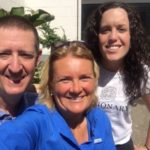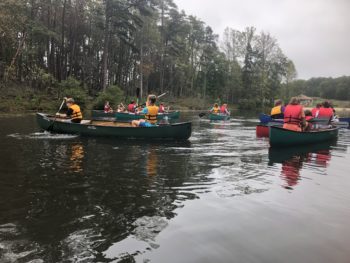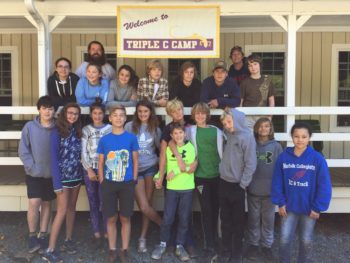Get to know Melissa!
My childhood memories include long summer days playing outside, laying on my back to watch the clouds float by, and making wishes on shooting stars. A child of the eighties, my brothers and I were often sent outside in the morning and told to come home for lunch. I was the last generation to spend my younger years without the presence of cell phones, tablets, and the internet.
When I was twelve my family sent me to an overnight camp, it wasn’t the first camp I had been to, but it was the first that felt like home. I remember the long drive, the curiosity, and the nerves. I had a hard time standing still while my parents checked me in, and a counselor asked me if I had any questions. I stood a little taller when the staff shook my hand, and introduced themselves to me.
I can no longer pull out the details of that week at camp, but I remember the confidence I felt as I waved goodbye to my parents. I remember the feeling of belonging throughout that week. I remember making new friends, and connecting with staff members that inspired me. And, of course, the overwhelming sadness when I first experienced missing camp at the end of the summer.
I had no idea at the time how much that summer was going to change my life. I spent my school year missing camp, counting down the days, and planning for when I would finally get to head back to camp. It was the place where I felt most comfortable, the place where I felt the most me. When I was a senior in high school I knew I could apply to be on staff for the first time, my Dad drove me four hours one-way for my 20 minute interview, and I spent the next weeks replaying those twenty minutes in my head, anxiously awaiting any news of my future employment. I accepted the job the moment it was offered.
Since then I’ve worked at numerous summer camps and environmental education camps in New York and California, and even started my own Forest School in Wisconsin. I met my husband at a camp, and we got married at a different camp. We’re raising our children at camp. My heart is at camp, it has been since I was twelve.
I believe in the magic of camp, that it’s a safe place for kids to try new things, challenge themselves, and make new friends. I believe that it’s one of the only safe places left where kids are free to be their truest selves, without the distraction of technology, or the pressure of school. We invite kids to be kids, and as a parent of (current and future) campers, that is something that I have dedicated my life to preserving.
I now get to watch my own three children grow up at camp. They thrive in an environment where they are surrounded by positive role models, where they are pushed to try new things, and where their imagination, creativity, and problem solving skills are constantly engaged. As my oldest prepares for his first official summer as a camper, I now get to take on a role I’ve always looked forward to, that of a camper’s mom.
Thanks Mom & Dad, for sending me to camp and starting my lifetime of adventure. That week at camp so long ago, has brought me to Triple C Camp today, where I can continue to share my love of camp, child development, and the outdoors.
Podcast: Play in new window | Download
Spring Break Camp 2019
One of our favorite parts of spring, is Spring Break Camp, and this week reminded us why we love it so much.
For a lot of our campers it was a week of firsts. The first time at Triple C Camp, the first time eating lunch outside, the first time at archery, the first time singing a new song, the first time playing sprout ball. At camp we love those moments, where we’re trying new things, challenging ourselves, and testing our limits, all in a safe environment.
Our week was full of moments, and each camper has different moments and memories that they take home with them. Our Pioneers performed a skit in front of the entire camp. Trailblazers were eager to work together on the challenge course. Explorers and Teen Scene hiked to the top of Kinsers. Each camper left camp today with new memories that are important to them.
Want to find out more about your campers week? Here are some questions that may encourage conversation:
- How did you help someone today?
- How did someone help you?
- What’s the name of a new friend you made? What did you do together?
- What new game did you learn this week? Why do you like it?
- What are seed balls? What ingredients did you use?
- What made you happy?
- How were you kind today?
- How was someone kind to you?
- How did it feel to draw your self portrait?
- What role did you play during teambuilding activities?
We hope to see you at our Open House on Sunday from 1-4!
Podcast: Play in new window | Download
Get To Know Max!
Hello! My name is Max Myers, Assistant Director at Triple C Camp. I am originally from Columbus, Ohio and attended Miami University where I completed my bachelors in adolescent science education. I have worked in Ohio, the Bahamas, California, Wisconsin (and now Virginia!) providing camp and environmental education programs to youth and adults.
I am a dad, and a husband, a messy cook, passionate about the environment, and have a bunch of other hobbies and perspectives. But first in my mind when I think of who I am, I see myself as a dad. My entire world view changed when my first child was born. I believe it does for most parents and caregivers when they assume the awesome responsibility of supporting a child as they grow, and find their way in the world.
As my world view became “dad centric” my perspective about the youth I worked with has also changed. I was once told to imagine that every camper/student was someone from your own family. How would you want them to be treated? What experience would you want for them? This sentiment really struck me as a way to be more empathetic and present with campers. It also pulled me towards Triple C Camp, where every camper, parent, and staff member becomes a part of the family.
At camp I want my kids to be safe and to have fun. I want magical and joyful experiences. I want them to be challenged to think deeply and do something that might feel scary, knowing they have help and support right there. I want my kids to make friends, and to be good friends. I strive to practice empathy and kindness at all times, and help the children I work with to grow more confident. At Triple C Camp, we aspire for the safest, most fun and joyful experience possible. We are in the business of youth development, it’s why I chose to work at camp. The safe, fun experiences I want for my children, I want for your children too.
I am not perfect, my kids are not perfect, and I don’t expect your kids to be perfect either. You can expect that everyday I will ask myself, “what would I want for my kids?” and will strive to provide that for every child I get the honor to spend time with.
I am excited to meet you this summer as we partner together to give our kids the opportunity to grow in a safe and fun environment. You can always give me a call 434.293.2529 or stop by camp to chat, I’d love to hear about your camper!
Podcast: Play in new window | Download
Meet the Myers Family!
The Triple C Camp Family has grown by five, recently welcoming the Myers family to Charlottesville. Max and Melissa (Assistant Directors) join us with their three young children (and future campers).
Jude Myers (age 6) is a kindergartner at Cale Elementary, and Pioneer Camper this summer. His favorite part of camp so far is the creek, where he can get muddy. When Jude grows up he wants to be an engineer.
Rory Myers (age 4) loves to ask questions, paint, and play dolls. She cannot wait to be with the horses this summer, and watch the campers at Colt Camp. When Rory grows up she wants to be a doctor with 100 babies!
Wes Myers (age 8 months) will be celebrating his first birthday at camp this summer. His favorite things about camp are all of the soil to put in his mouth, watching the big kids play, and hearing songs.
The Myers family has been exploring Charlottesville, and is excited to have become a part of this amazing community. They have been working hard to discover the best ice cream in town.
A Note From Kasey
It’s 11am at Tullamarine Airport, Melbourne, Australia and I’m waving goodbye to my parents as I’m about to embark on a flight to the U.S.A. The excitement of a new adventure, and the tough goodbyes all happened so fast, that before I could blink, I was setting off on an amazing journey. My head was filled with excitement and curiosity of the unknown: What’s the food like? Will I make friends? Is everything really bigger in America? The list goes on. These were all questions I had going to camp for the first time. Getting to travel around the globe and spend 3 months at Triple C Camp having the traditional summer camp experience was more than I could have imagined! Stepping outside my comfort zone was only the beginning of wonderful opportunities and personal growth.
Fast forward 6 years and I look back on my journey and how it has positively impacted me, and still continues to do so. Just like a child going to camp for the first time, I experienced many of the same feelings, the excitement and nervousness all wrapped into one. But what reassured me that everything was going to be okay, and that I was going to have an exciting time was the pre camp communications and first few minutes I was welcomed at the airport by Triple C Camp’s owner “H”. With a big smile and solid high five, I felt instant relief and knew that coming to camp was going to be the coolest place. As soon as we arrived, I was greeted by smiling staff, all introducing themselves with a handshake, high five, or hug and looking into my eyes, showing that they cared I was there. This welcoming made me instantly feel part of an awesome community.
First impressions make lasting memories. It is these same first impressions that our staff use to connect with your child not only on their first day of camp, but every day after that. We strive to make your child feel safe and excited to be at camp. We see the benefits, first hand, of building healthy relationships, gaining new skills and having experiences which will be carried into their adult lives. It is all about growth and development. With how fast paced and tech savvy our world is, children are experiencing their world in many different ways. However, coming to camp can help us connect not only with our environment, but with each other. Campers learn to build relationships, use social cues, be expressive, use their creativity, and develop their fine and gross motors skills all in an environment that is safe and fun.
There are many reasons why I am so passionate about camp. Over the past 6 years I have been fortunate to be part of many of your children’s lives and during that time I have grown as an individual. The campers have taught me to better understand people, be more patient and understanding, but mostly how to better connect, build relationships and be a positive role model. A role model that children and adults can look up to, someone who can encourage and support, someone who is respectful, yet fun. I am not perfect (as we know, no one is) and camp continues to teach me every day how to be the best person I can be.
I believe that camp teaches everyone something unique. Leaving camp is always hard no matter how old you are. You always leave a piece of you at camp and finishing up the summer is always bitter sweet. I also experience that feeling of wanting to be back, to learn and grow, and this has continued to be part of me since my first summer at camp. Camp has given me new experiences, skills, understanding of people, created wonderful relationships and I have really gained a passion for the camping industry. Looking back, it’s hard to believe that after my first summer I would continue to return and now make camp my everyday adventure. Coming to Triple C Camp opened my world up to new opportunities and encouraged me to dream big, work hard and love coming to work every single day. Thank you to everyone who has been part of my journey so far and I look forward to new successes in camp for many years to come.
Yours in camping,
Kasey
Friendships
 Camp is about fun, learning, being outdoors, and making friends to last a lifetime! We see these friendships blossom among our campers each summer and watching them continue those friendships for years is worth those hot and humid camp days! And, while this happens for our campers, these friendships also form among our staff.
Camp is about fun, learning, being outdoors, and making friends to last a lifetime! We see these friendships blossom among our campers each summer and watching them continue those friendships for years is worth those hot and humid camp days! And, while this happens for our campers, these friendships also form among our staff.
Each summer, approximately 30% of our camp counselors come from abroad. From countries across the world such as Australia and  New Zealand, to a bit closer in Mexico. These staff, along with our staff from the States, work together each day to grow and develop our campers, and while that is happening, they grow and develop friendships among themselves.
New Zealand, to a bit closer in Mexico. These staff, along with our staff from the States, work together each day to grow and develop our campers, and while that is happening, they grow and develop friendships among themselves.
As a staff member going on my 13th year, and as a camper for 7 years before that, I have experienced numerous of these friendships, and many continue to go strong to this day. It is because of these friendships, which all started at  Triple C, I can travel the world and get to see people, see their culture, and experience their lifestyles! As a matter of fact, as I type this, our Owners and Directors, Libby and “H” are Down Under in Australia and New Zealand with a plan to visit 20+ staff. All of whom have worked at camp over the past 19 summers. (See some photos below!)
Triple C, I can travel the world and get to see people, see their culture, and experience their lifestyles! As a matter of fact, as I type this, our Owners and Directors, Libby and “H” are Down Under in Australia and New Zealand with a plan to visit 20+ staff. All of whom have worked at camp over the past 19 summers. (See some photos below!)
Friendships lead to adventure, and adventures lead to lasting memories.  At Triple C, we strive to create those adventures and memories for our campers and staff while they are here at camp, and help build those friendships so that those adventures and memories can keep going for years on end.
At Triple C, we strive to create those adventures and memories for our campers and staff while they are here at camp, and help build those friendships so that those adventures and memories can keep going for years on end.
Williams School 7th Graders Fall event at Triple C Camp
Our experience at Triple C Camp was fun, but it is about more than fun. At camp you learn team building and cooperation. We had so much fun collaborating with all our classmates and getting to know the new ones and becoming closer as a class. On the first day here we did collaboration exercises, climbed the tower, and zipped down the super exciting zip line. One of our classmates was really scared and said she was not going to climb, but Kasey, the Triple C facilitator, supported her and talked her through each of her goal points. In the end, our classmate was successful in her climb and even zipped. We all cheered her on!
You also learn about flexibility and adapting to situations, as hurricane Michael helped us learn. We were to have a full day on the James River and then an overnight camping. This had to change due to the safety of the river. Though we were very sad about not having the camping trip due to weather the counselors had great ideas and activities for us to learn from and made the trip really fun anyway. We went canoeing at Walnut Creek Lake for the day and swam at the beach that we canoed to. Ryan taught us how to throw the rescue throw bag and let us water ski with it. We did water chemistry testing and used secchi disks in the lake.
It was a very good experience and we highly recommend it to anyone. Triple C has great staff, including Rondo and Nika the dogs, which adds on to the experience. All our meals were very yummy. Our night programs were fun too. At our first campfire we cooked s’mores the first night and due to weather we made banana boats in the camp kitchen, the second night. It was the first time any of us had had that type of treat and we thought they were even better.
We are sad to leave Triple C Camp especially since it is our last visit as a class, we came last spring too. We are going to miss the counselors, Kasey, Ryan, Robin, and head director and owner Libby. Eryn too, she is a good cook. We hope Triple C Camp is enjoyed by many more kids like us.
Thank you Triple C for this amazing experience,
Williams School 7th grade
A Deeper Look Into Positive Discipline
Camp has changed significantly since my first year as a Counselor in 1989. Advancements in camp are amazing. Examples include: online registration, drones shooting video footage, cool fun water tramps and climbing devices, Overnight Camps have shorter sessions, and Day Camps Programs growing in numbers every summer. The biggest advancements across the industry are not as obvious. The focus on child development has become the priority for camps that want to positively impact children’s lives.
When I became a director in 1990 (Overnight; Camp Menominee, Eagle River, WI) and Camp Owner 1999 (Day; Triple C Camp, Charlottesville, VA) it was clear there needed to be intentional strategies to support counselors with camper behaviors. By ’99 stereotypically, more campers were acting out and our staff recognized that younger children needed a “camp oriented” plan for discipline support. We found male camper’s parents were turning to medicine to treat their child’s poor behavior vs. problem solving strategies.
When campers want to be at camp (especially overnight camp), there is little need for discipline. They are excited to be involved in the activities and follow their Counselors and the camps’ direction. Many become strong leaders through this healthy environment. Campers get positive attention and love the experience. These campers are normally described by their Counselors as, “these campers are great.” “Great Campers” pay attention, follow directions and want to be good friends to the other campers and staff. However, there are times when any of us could behave imperfectly and it is critical for camps to have a strategy regarding discipline. What’s the plan?
Discipline defined: the practice of training people to obey rules or a code of behavior, using punishment to correct disobedience.
As camping professionals, we need a plan. John Wooden said, “Failing to Plan is planning to fail.” There are a number of camps that choose to operate “by the seat of their pants/without a plan.” Whether it is a plan for discipline, intentional direction for staff about child development, or program schedules. Many directors allow Counselors to “wing it.” Having a plan puts Directors and frontline staff on the same page. There can always be flexibility within the plan; however a starting point is a must. When it comes to discipline, Counselors are in the trenches trying hard to do great work with the campers as their Director desires, however did the Director set staff up for success with an intentional plan?
The strategy below has evolved and worked at our camps for the last 25+ years. It is not perfect, however it is a plan. Have a plan for your staff, role play and teach staff how to use this or any strategy and they will be better prepared to execute.
Priority #1 in positive discipline: make a huge deal out of positive behaviors. Bob Ditter refers to “Connect before you redirect.” Connecting could be a respectful friendly touch, a nod of the head, or an empathetic look, you can use your own strategies, JUST HAVE A PLAN. This is critical in the relationship between camper and staff. Making a connection builds clout with campers when things go imperfectly and they will! When campers meet their Counselors for the first time, it should be celebration for both. Staff are super excited to finally be with campers they have been trained to grow and develop emotionally, mentally and physically. Campers will be excited and nervous to learn about this great leader they have been promised. Counselors need to be proactive in this moment when they meet. Energy, excitement and fun from the staff will instantly let campers know their Counselors are interested in them and will quickly become friends. Also, have your staff welcome with fun visual statements such as name tags, decorations, and fabulous first hour activities including name games help with building relationships at the very beginning. You may ask what this has to do with discipline. When staff are connected to the campers and there is a mutual respect, the need for discipline is minimal.
Positive words have an enormous effect on humans. When someone in charge asks someone to do something, we put into our heads the expectation, very often in the form of a picture. When a person gets asked not to do something, we also put a picture in our head. This is when it can get confusing. If I’m the person in charge and supervising you and say to you, “Please close your eyes and DON’T THINK OF A PINK ELEPHANT!” Did you just think? When we ask a child to NOT DO SOMETHING, why do we expect them to comply? For example, a camper is standing on a picnic bench. Staff says, “Get off the bench!” What does the camper want to do, stand on the bench more. If the staff member says, “Please put your feet on the ground.” The staff member will see much better results from the campers. Be intentional with this training. It takes a lot of practice to become permanent.
There is always a possibility of a camper acting imperfectly! What do we do?
Campers are looking for attention. What type of attention and how we give it to them is ultimately up to staff. Train your staff to make a huge deal out of the positives with campers and to deal with the negatives, do not make a big deal out of the negatives. Campers will fulfill the expectations we set for them. During the first hour or two at camp, make sure that campers are clear on behavior expectations and that staff are clear how to positively reinforce. Make use of the documents such as 100 ways to praise a child. Distribute them during staff training and role play behaviors and expectations.
When a child makes a choice different from what is in his/her best interest and your staff observes said choice, teach staff how to redirect the behavior to a more positive focus. If Johnny is throwing rocks in the creek, and the desired behavior is looking for salamanders, Counselor could say, “Johnny, please come over and help lift this rock and let’s see what’s under it.” Most of the time redirection like this will accomplish the goal of getting the camper back on track. You will notice that the Counselor never said anything about the negative choice (throwing rocks). Staff should focus on the desired behavior. Based on how the Counselor has built a relationship with Johnny before this incident will be a factor/determination how Johnny responds. When we have respect toward campers and they respect staff, redirecting takes place easily without conflict. If a staff member gets push back, it may be due to a lack of respect from the camper. Staff must respect all campers and work on “connecting before redirecting.” The child also may be looking for negative attention and not want to do as the Counselor requested. When this happens, we challenge the staff to NOT mention the negative behavior. Focus on the desired behavior.
If Johnny ignores the Counselor and is still throwing rocks in the creek, we offer Johnny choices. Still never mention throwing rocks, the Counselor would say, “Johnny, you have a choice to make, please come over and help with lifting these rocks and looking for salamanders, or you will have a time out. It is your choice.” We believe in short in sight timeouts. For some campers one minute is sufficient. If Johnny refuses the desired behavior, then the staff member MUST FOLLOW THROUGH and put Johnny in time out. Pick a location that is close where the Counselor can see Johnny and where he will not be a distraction for the rest of the group. After a minute or two, go over and talk with Johnny. Still never mentioning that he was throwing rocks and try to build back a connection that may have been lost by Johnny’s choice to take a time out. Get Johnny back to the desired activity with the other campers as soon as possible and reinforce the next positive action Johnny has to build back so staff can build back anything they may had lost with Johnny.
If Johnny continues to throw rocks in the creek and ignores the Counselors direction for time out (rarely gets this far with kids who want to be at camp), then we give Johnny more choices. “Johnny, please sit on that stump in time out, or you will see the Director. It’s your choice.” Sub consciously the Director is a direct line and contact to Johnny’s parents or family. Again, if Johnny does not make a choice, then the Counselor MUST FOLLOW THROUGH and involve the Camp Director. This allows for the Counselor to focus on the campers that want to have a fun time with the rest of the group and a camper who is looking for negative attention will receive support from the Director so that we can reset expectations with said camper. The Director will go through the stages of conflict resolution with the child and make the Counselor aware of what took place. The Counselor MUST have the support of his/her Director for success. Once the Director has spoken to the child, the camper needs to make restitution with the Counselor or possibly other campers. Tip: Director comes to area where child was misbehaving. If camper has to make the long walk to the office, they may forget the reason they were in trouble or be apologizing all the way.
If two campers are having verbal or physical difficulties, a different approach can be used. First, if campers have made physical contact with each other in a hurtful way, we want the Director to be aware and discuss the plan. We train staff to work it out with the campers; this empowers the staff to focus on group relationships. If two campers are getting on each other’s nerves, staff must keep their eyes and ears open and possibly direct campers to physically put some distance between them short term. Long term, we need to learn how to work with each other. In life individuals must recognize each other’s differences and embrace the other for differences. When campers cannot work out their differences this is when a staff member/Director can help them work through their issues. Very often this skill is beyond that of our teen age or young 20’s staff. Utilize an experienced director and communicate appropriately with parents. When campers return, the group should be addressed. The group should discuss problem solving and choices we make that have real consequences. Processing the experience is an important part of the process.
None of us are perfect. We as Directors must support our staff while working with difficult/all campers. We must partner with parents to help campers grow and develop and understand issues of attention seeking, gaining friendships, and skill development. When imperfect moments arrive, stay the course and support our Counselors. Give them a plan and expect it to be executed. Hold staff accountable to the plan as it is in the best interest of the campers you serve. Then, positively reinforce your staff. We must practice what we are teaching. Camp will be a better place for the campers when you positively reinforce, have a plan for discipline, and staff/campers are aware of expectations and that you as the Director will follow through.
Howard “H” Rothenberg is an ACA Visitor and Co-Owner and Director of Franchise Operations for Hi Five Sports Franchising, Owns Camp Coach (www.campcoach.com) and co-owner of Triple C Camp in Charlottesville, VA. www.tripleccamp.com Reach “H” about anything camp: [email protected]
Countdown to Summer!
45 days until camp! Here are the 45 things we are looking forward to this summer at Triple C!
- PLAYING GAGA
- CAMPFIRE SONGS
- MAKING NEW FRIENDS
- SWIMMING EVERY DAY
- PIZZA STICK LUNCH
- PURPLE VS GOLD COMPETITIONS
- BUILDING FORTS
- SEEING YOUR FAVORITE COUNSELOR
- LEARNING NEW GAMES
- CATCHING LIGHTNING BUGS AT THE OVERNIGHTS
- SITTING NEXT TO YOUR BEST FRIEND ON THE CAMP BUS
- WEDNESDAY DRESS UP
- RAISING THE FLAG AT MORNING OPENING
- CATCHING CRAYFISH AT WATER CHICKEN WAY
- SEEING OLD FRIENDS
- MAKING CREATIVE NOISE AT THE MUSIC CIRCLE
- PLAYING THE “FRIDAY” SONG AT LUNCH ON…WELL…FRIDAY!
- MEETING NEW COUNSELORS
- PLAYING ON THE SLIP AND SLIDE
- TRYING SOMETHING NEW
- SEEING YOUR FRIENDS AS YOU GET OFF THE CAMP BUS
- KNOWING WHAT THE MOST IMPORTANT THING AT CAMP IS
- ALL THE WATERBALLOONS YOU CAN IMAGINE
- WAVING “BYE” TO THE HORSES AS YOU DRIVE OUT OF CAMP
- IMITATING THE INTERNATIONAL COUNSELORS ACCENTS
- SOCCER DODGEBALL
- TRAILBLAZER CHOICE
- PLAYING IN THE RAIN
- GETTING DIRTY AND NOT CARING
- WINNING THE WASTE COMPETITION
- BEING CALLED UP FOR A KUDOS!
- COOKING LUNCH OVER THE CAMPFIRE
- SEEING IF YOU MADE THE DAILY YOUTUBE VIDEO
- WHEN YOUR COUNSELOR GIVES YOU 5 MINUTES ON THE PLAYGROUND
- NEW CAMP TEE SHIRTS
- LEARNING NEW FRIENDSHIP BRACELET PATTERNS
- SMELLING LIKE SUNSCREEN ALL DAY EVERY DAY
- CLIMBING KINSERS
- PREFORMING AT ROUND UP
- WINNING THE BFC
- DRINKING LOTS OF WATER
- FINDING A 4 LEAF CLOVER
- GOING TO ARTS AND CRAFTS EVERY WEEK
- HITTING THE HARDEST TARGET AT THE ROCK RANGE
- HAVING FUN!
The Research Behind Summer Camp
There are a variety of different images that pop into people’s heads when they hear the words summer camp. This is based on personal experinces, actually attending camp, visiting a camp, seeing camp in a movie, or family camping trips. Many people are not aware of the professional level of camping around the world. The American Camp Association is a community of camp professionals who, for over 100 years, have joined together to share knowledge and experience and to ensure the quality of camp programs. Thre are over 11,000 members, a full board of experience from many walks of life, and relationships with top business executives around the world.
As a leading authority in youth development, ACA works to preserve, promote, and improve the camp experience. The association is committed to helping camps provide:
- Camp communities committed to a safe, nurturing environment
- Caring, competent adult role models
- Healthy, developmentally appropriate experiences
- Service to the community and the natural world
- Opportunities for leadership and personal growth
- Discovery, experiential education, and learning opportunities
- Excellence and continuous self-improvement
When an organization operates at this level, impacting this many people… it craves statistical data, which is obtained thru research.
The American Camp Association continually does research to support the values of camp. Currently an impact study is ongoing to identify distinct and transferable outcomes of the camp experience among emerging adults who attended camp as a child. Specifically, the research team is exploring the outcomes of camp that are distinct from other developmental contexts, such as school and sports, how camp participants use those outcomes to navigate work and school, and what happened at camp to facilitate outcome development.
Early findings
Because of the exploratory nature of this phase, it is important to consider these findings as emergent rather than conclusive or generalizable across all campers or all camp experiences.
- Camp appears to be a key context for developing relationship skills. This is consistent with past research on camp, but Phase 1 findings suggest that the relationship skills young people gain at camp might play a role beyond the camp experience.
- As a context for developing relationship skills, preliminary findings suggest that camp is an integral part of a young person’s overall learning, alongside school and other educational contexts.
- Camp is a unique learning experience that appears to promote skills transferable to 21st century school and work contexts.
- Preliminary findings suggest that camp is a safe place for young people to explore who they are and how they want to be viewed by others.
- Camp gives campers the opportunity to practice being around and appreciating people with attitudes, values, and abilities different from their own.
- Phase 1 themes suggest that camps promote camper outcomes through robust programmatic structures and processes distinct from other youth development experiences. These include:
- Prioritizing experiential learning in structured activities and during unstructured time;
- Meaningful interactions with caring, compassionate staff who serve as teachers and facilitators, and possibly near-peer role models;
- Small group experiences;
- Among overnight opportunities, communal living that is away from home.
As a Camp Professional I love what I do. Camp Professionals can share experiences, give programmatic examples, site specific data for their camp demographics, and tell feel good stories all day long. It is nice to have a full professional research team investigating and validating thru statistics, what we at Triple C Camp “know in our hearts” – Camp gives kids experiences that will far outlast a summer.
References:
https://www.acacamps.org/about/who-we-are
https://www.acacamps.org/resource-library/research/research-reports






